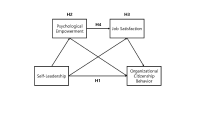The objective of this study was to examine the relationships among preferred and perceived leadership behavior, their congruence, and satisfaction with leadership based on Chelladurai's(1978) Multidimensional Model of Leadership(MML). To achieve the study objective, 210 professional dancers from 6 professional dance teams located in Seoul and the suburbs participated in this study. For hypotheses testing, descriptive statistics, hierarchical multiple regression analyses, and a confirmatory factor analysis using SPSS and AMOS were used. Results showed that the congruence between preferred and perceived leadership behavior did not have statistically significant influence on dancers satisfaction. The results of the study were inconsistent with what MML suggested. However, the results were quite consistent with empirical evidences of previous studies that investigated the influence of the congruence between preferred and perceived leadership on satisfaction.

[Purpose] The purpose of this study is to draw practical implications applicable to the field through analysing serial multiple mediator model of self-leadership, psychology empowerment, job satisfaction and organizational citizenship behavior. [Methods] In order to achieve the purpose of this study, we surveyed Korea national league players(187 usable sample). Four hypotheses were tested using frequency analysis, exploratory factor analysis, reliability analysis, correlation analysis and PROCESS macro through SPSS statistics. [Results] The results are as follows. First, self-leadership has a significant effect on organizational citizenship behavior. Second, mediating effects of psychological empowerment between self-leadership and organizational citizenship behavior were significant. Third, mediating effects of job satisfaction between self-leadership and organizational citizenship behavior were significant. Fourth, serial multiple mediator effects leading to self-leadership→psychological empowerment→job satisfaction→organizational citizenship behavior were significant. [Conclusions] Korea national league players must perform self-leader, goal setting, self-observation, self criticism, constructive thinking strategies, dedication and voluntary attitude for clubs and colleagues. The team’s coaches should strive to praise the athletes for their pride, provide appropriate feedback, prevent job burnout, and the management of front office should make practical efforts such as improving the welfare environment and presenting the future vision of club.

PURPOSE The ethical leadership of Taekwondo instructors plays a crucial role in enhancing the value of Taekwondo. Therefore, this study explores the elements of ethical leadership among Taekwondo instructors by drawing on the insights from Lao Tzu's Tao Te Ching. METHODS Through the Tao Te Ching, an oriental classic containing the ideas of Lao Tzu, we have extracted and discussed the elements of ethical leadership that Lao Tzu conveys to Taekwondo leaders in this era. RESULTS The ethical leadership of taekwondo leaders in the Tao Te Ching was presented as the virtues of inaction and humility as behavioral norms. Inaction as a code of conduct was discussed about a leader who practices inaction in a changing world through subjective thought rather than a meaningful Taekwondo leader who leads Taekwondo with an existing pattern and looks at ethics. A Taekwondo instructor must possess the virtue of humility. A Taekwondo instructor with humility must be glazed, soft, and humble as water. CONCLUSIONS In a Taekwondo culture that follows the Confucian ideology of extreme austerity, Lao Tzu's ethic of non-action and the virtue of humility can be like wearing an ill-fitting robe. However, standing on the edge, outside the frame of reference of the ideologies and values we have come to believe in and follow, and seeing the world as it is, not as it should be, according to the laws of nature, provides a new discourse for Taekwondo philosophy.